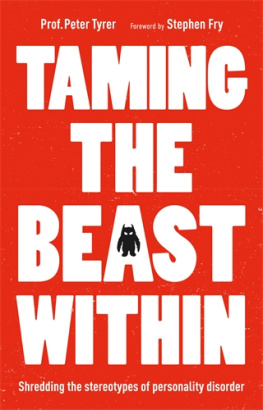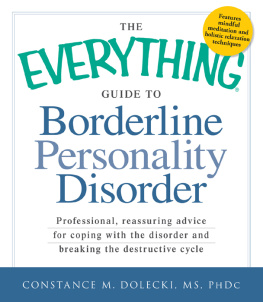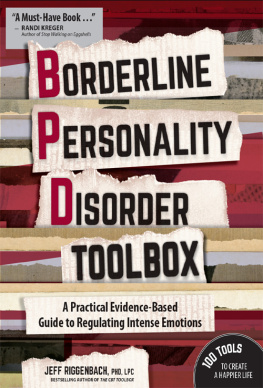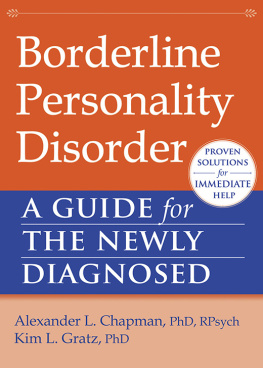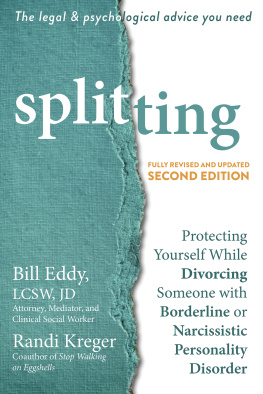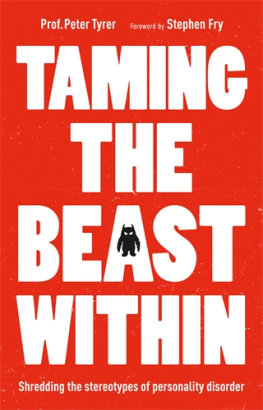Taming the Beast Within
Peter Tyrer was Professor of Community Psychiatry, now Emeritus Professor, at Imperial College, London, and is an expert in personality disorder. He was the founder president of the British and Irish Group for the Study of Personality Disorders and, from 2010 to 2017, Chair of the Work Group for Revision of the Classification of Personality Disorders (ICD-11) for the World Health Organization. He has published over 500 original papers and 31 books, including Coping with Stress, for Sheldon Press. In 2015 he was given the Lifetime Achievement Award by the Royal College of Psychiatrists in recognition of his research and clinical practice. He continues to be involved in research, mainly into nidotherapy, and is chair of NIDUS-UK, which supports the development of nidotherapy. All the royalties from this book will go towards the work of this charity.
First published in Great Britain in 2018
Sheldon Press
36 Causton Street
London SW1P 4ST
www.sheldonpress.co.uk
Copyright Professor Peter Tyrer 2018
All rights reserved. No part of this book may be reproduced or transmitted in any form or by any means, electronic or mechanical, including photocopying, recording, or by any information storage and retrieval system, without permission in writing from the publisher.
The author and publisher have made every effort to ensure that the external website and email addresses included in this book are correct and up to date at the time of going to press. The author and publisher are not responsible for the content, quality or continuing accessibility of the sites.
British Library Cataloguing-in-Publication Data
A catalogue record for this book is available from the British Library
ISBN 9781847094759
eBook ISBN 9781847094766
Typeset by Falcon Oast Graphic Art Ltd, www.falcon.uk.com
First printed in Great Britain by Ashford Colour Press
Subsequently digitally reprinted in Great Britain
eBook by Falcon Oast Graphic Art Ltd, www.falcon.uk.com
Produced on paper from sustainable forests
To Helen
for converting my personality weaknesses into strengths
TABLE OF CONTENTS
Foreword by Stephen Fry
We are all, I hope, conscious of how much mental health has recently entered the national conversation. We are now more aware than ever of the prevalence of mental illness among the population. Issues of suicide, self-harm, declines into illness-induced drug and alcohol dependency, working days lost, friendships, families and educations blighted these have all been ventilated in the press, online and in documentary, biographical and fictional representations everywhere. Schools, human resource departments and government agencies are more alive than ever to the need for destigmatization, understanding and help with the enormous burden that mental health places on the public purse and on public happiness and well-being.
It is an urgent crisis and, while the fire-fighting aspects of diagnosis and treatment remain supremely important, we cannot forget the need continually to parse, construe and comprehend the language and meaning of mental illness. In the USA the Diagnostic and Statistical Manual of Mental Disorders (DSM) has attempted to categorize the subject into a kind of taxonomy, much as we categorize plants and animals, dividing extreme and distressing mood swings, for example, into the diagnoses of cyclothymia or bipolar 1 and 2, and famously attributing to autism a spectrum. The DSM stands as much as a kind of bible and manual for law courts, industrial tribunals and the insurance business as a genuine revelation about the meaning of illness. All well and good, but labelling reveals more about the state of society than the state of the human mind: a butterfly will flutter by just the same whether you call it a pretty creature, a Monarch or Danaus plexippus. Naming is important but can sometimes block rather than aid comprehension.
One division of mental health conditions that the general population has picked up on is the apparent distinction be-tween mood disorders and personality disorders. Those of us who, like me, have suffered from the effects of bipolar disorder like to congratulate ourselves on the purity and constancy at least of our personalities. The illness, we say to ourselves, is like the weather. It comes from outside of who we are. We might be made alarmingly enthusiastic, exuberant, grandiose and overconfident when in the grip of elevated moods, or grumpy, silent, morose and pessimistic when depression descends on us like a leaden cloud, but inside we are ourselves, all right and tight. Personality disorders that is, what the boogeyman suffers from they are dark and dangerous territory. To be told we suffer from such threatens our sense of self and the very ownership of who we are.
We know too much, alas, about how character, disposition and behaviour can be apparently turned upside down by trauma or infection to the brain to be confident that there really is some stable enthroned entity called a personality, which, unlike the liver or skin, for example, stands gloriously immune from degradation and disintegration. But what is it? What marks out a personality disorder? Is it what might have been called a character flaw or moral degeneracy generations ago? The term personality disorder (accompanied by such ascriptions as passive-aggressive or narcissistic) can be hurled as an insulting grenade at people whose ideas and behaviour threaten or annoy us look at how President Trump at the time of writing is characterized. Are such distinctions and classifications useful or meaningful? If so, how do they help us towards treatment?
So many questions are raised by this subject and yet the fear raised by the greater stigma and apparently sinister aspects of personality disorders has meant that they are much less readily discussed and demystified than other forms of mental illness. Now at last comes this exceedingly helpful and instructive book. Professor Peter Tyrer has really let in the air and the light and discusses the many aspects of personality with just the kind of clarity and authority that will be most useful to the general public and health professionals alike. The language he uses is clear and comprehensible; the ideas he raises will live with you for a long time.
Stephen Fry
Preface
Why have I written this book and who is it for? I have done so because I want to get the subject of personality disorder out into the open, untrammelled and unadorned, and also to correct a host of misconceptions about personality, including personality difficulty and disorder. These misconceptions are shared equally by the public and the medical profession, so I have a hard task in trying to change a great number of established views, most of them being highly negative.
There are many reasons for these misconceptions. The subject of personality disorder has been on the fringe of psychology and psychiatry for many years. Mental health has always been at the edge of medicine and is only just beginning to be understood fully and to achieve a measure of respectability. But if general medicine is like the Earth in the planetary system and mental illness winking close by as Mars, personality disorder is like the far off Pluto, only occasionally coming into view in its highly irregular wacky orbit and being the butt of jokes, many of them deriving from Disney and one of its well-known dogs. A suggestion made two years ago was Donald Trump, President of Pluto, and nobody thought anything could be more offbeat than that, unless it was Donald Trump, President of the United States?
Personality disorder has also been rejected as a term by psychiatrists, and they are meant to know the subject. At various times it has been regarded as a form of moral degradation, a label for the tired, poor and tempest-tossed, a poor reason for not making a proper diagnosis, and an expression of personal disgust. Personality disorder: The patients psychiatrists dislike was the title of the paper published by two of my colleagues in 1988.1 It is one of those papers in which the title conveys the whole content of the paper. It also reflects a remarkably accurate view across the range of the health professions. If we do not like the people we assess, and cannot stand the thought of treating them, it is tremendously useful to have a diagnosis that can be attributed and repeated as part of an allegedly careful clinical assessment. Mrs Smith may have anxiety/depression/phobias/rituals but the presence of her associated personality disorder/difficulties/issues/problems/handicaps/disability means that she is unlikely to be helped by our treatment, so I am sorry to say that your referral for treatment has to be rejected. Personality disorder always fails quality control.
Next page
